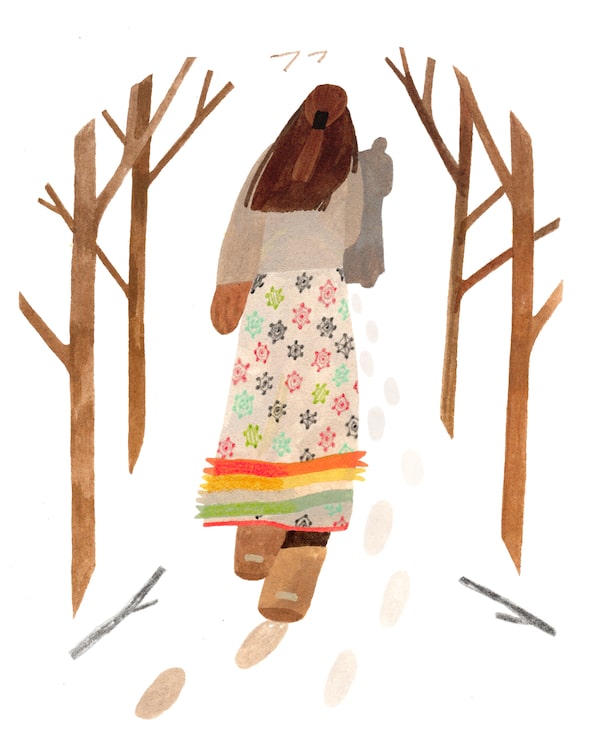First Person is a daily personal piece submitted by readers. Have a story to tell? See our guidelines at tgam.ca/essayguide.

Illustration by Mary Kirkpatrick
September, 2021
I step foot onto the sprawling campus that I now call home, almost 1,000 kilometres away from where I grew up. Nerves flutter through my body and I tremble as I move toward the stunning red brick and ivy buildings. My eyes go wide as I take in the impressive campus. The Grade 12 students, smartly dressed in their crisp kilts and shirts with school crests surround me, bubbling with excitement. Relief washes over me as the staff welcomes me with kindness. My nerves slowly start to dissipate from my body, after weeks of built-up anxiety. I think I love it here.
September, 1950
My grandmother sits on the shoreline of Lake of the Woods in northern Ontario, looking out at pristine water. She looks behind her and sees her mother and sisters laughing while skinning a beaver hide. She sees her brothers and father in the distance, coming back from their strenuous day of trapping. Her days are hard, but she wouldn’t trade it for the world. She loves being surrounded by her traditional Ojibway land, filled with trees, animals and water. As she looks out onto the lake, she sees a motorized boat heading toward her home. Dread seeps into her soul, and even at age 7, she immediately knows what’s coming. As the boat comes closer into sight, her worst fear is confirmed when she spots a priest and police officer in the boat, coming to rip her family apart.
September, 2021
I’m sitting in my bright dorm room with my mom, unpacking my belongings. The room still smells like sage, the remnants of the smudge we did when we first entered the room. We perform this ceremony in order to purify my new living space and to give thanks for this next chapter in my life. Placing pictures on my wall, I am immediately put at ease when I see the smiling faces of my best friends, my parents, my brother and my grandparents in this new space. I go over and give my mom a hug, just because I can.
September, 1950
My grandmother looks up at the tall, imposing red-brick building. It looks like a prison. What she would do for her mother’s comfort right now. The priest marches her and her siblings off the boat and up to her new home. Separated from her brothers, she’s pushed into a dark room, where she will have everything she has known stripped away. Her new “parental figures” cut her hair, scrub her and give her old, dingy clothing to replace her familiar traditional clothing. “Your parents are savages,” they tell her. “You have been saved,” they explain. This doesn’t feel like I’m being saved, she thinks.
January, 2022
I have been at boarding school for five months. I am so glad I chose to come. I am learning so much. I am able to speak my own mind. People listen with open eyes and hearts when I speak on issues that I am passionate about, such as truth and reconciliation and my Anishinabe culture. I am allowed to speak my truth without repercussions. My risk of leaving home at 15 to experience new things and receive a better education has certainly paid off.
January, 1951
My grandmother has now been at St. Mary’s residential school in Northern Ontario for five months. She is hungry, scared and has suffered abuse. The only thing she has learned so far is to not speak her own language. She learned this the hard way. Her nose is broken and her teeth are shattered after a beating from a nun. She is forced to pray every single day, but her prayers are not being answered. She wants to go home.
A couple of months later, my great-grandparents make the journey across the sprawling lake to visit their children. When they arrive, they find themselves locked out of the school, only able to see their children peering down from the third-floor window. The nun tells them to leave. They walk away with tears streaming.
May, 2022
I proudly wear my ribbon skirt around my school on Red Dress day and hang the red dresses around campus with pride. I honour my missing and murdered Indigenous sisters, and give a speech in front of the school community in order to bring awareness to this gut-wrenching issue. It is a devastating topic, but I still feel pride in the ability to share my culture with this new community.
May, 1951
It is nearing the end of the school year, but my grandmother is unable to wait. She is suffering in school – in this prison, acting as her school. It has created unbearable trauma for her. She is hungry and abused. She fears for her life and feels that she is being worked to death by the nuns. On a bright spring day, she finally has a chance to run away. She peers around the courtyard, verifying that no one else sees her, and dashes into the woods. She runs until her legs give out under her. After a few hours, she is found by a school administrator and dragged back to the building. A severe beating is waiting for her once she returns to campus.
May, 2022
My grandmother and father have flown out to visit me in Victoria. I excitedly show them my decorated dorm room and introduce them to my incredible teachers. I show them the campus, barely able to contain my enthusiasm.
My grandmother walks the campus relieved to see that my boarding school experience has been the polar opposite of hers.
This is what healing feels like.
Naashkii Soler is traditionally from the Ojibways of Onigaming in Northern Ontario. She goes to school in Victoria and lives in Canmore, Alta.